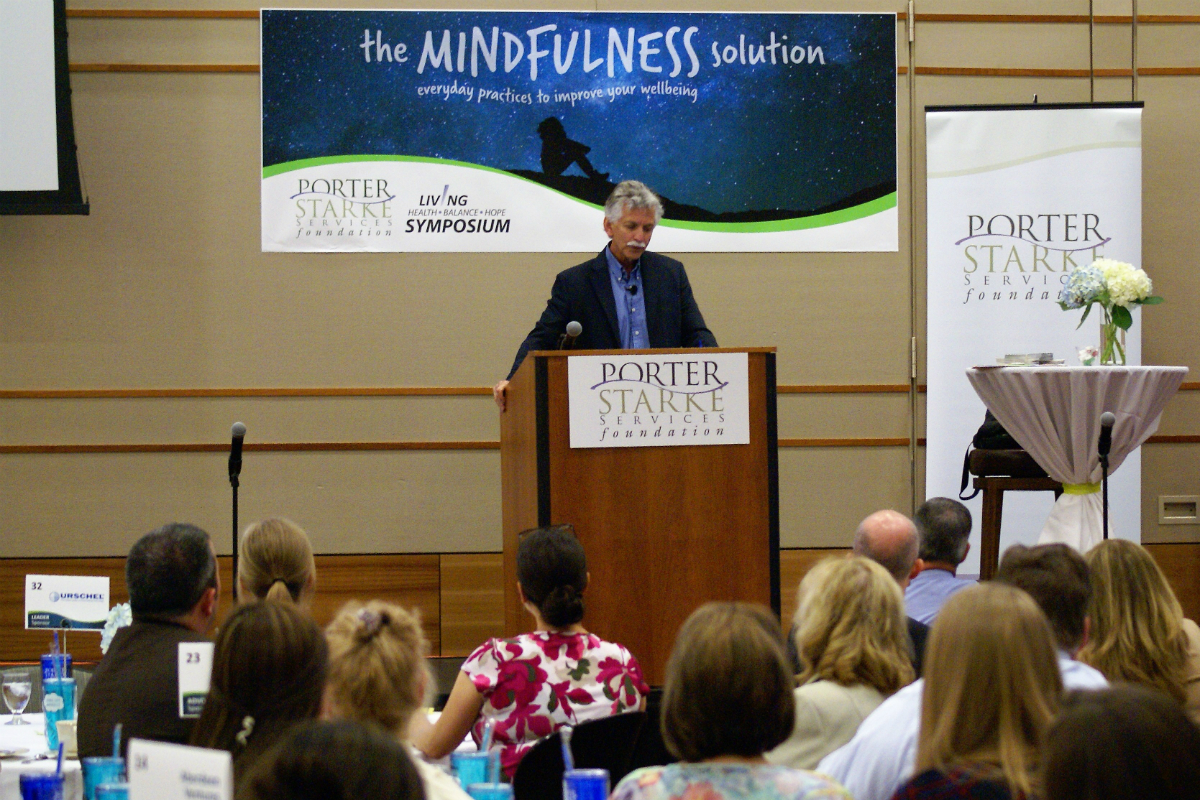Early Thursday morning at Harre Union on the Valparaiso University campus, Porter-Starke Services Foundation hosted their 2018 Living Health, Balance & Hope Symposium with special guest Ronald D. Siegel, PsyD. The annual symposium helps educate, advocate, and celebrate mental health and wellness, and features leaders and innovators from the field speaking on a variety of subjects.
This year’s symposium: The Mindfulness Solution, Everyday Practices to Improve Your Wellbeing, lived up to its name.
“Mental Health, in a hierarchy of health issues, is usually towards the bottom. But just because someone doesn’t have a broken bone, doesn’t mean they aren’t hurting,” said attendee Michael Newhard of Bartholomew Funeral Home in Valparaiso. “Patients don’t always know where to go to get that mental health support, and it’s important to support that.”
Guests were treated to a breakfast of bacon, coffee, and an array of tasty sweets among other things to fuel their minds ahead of this informative talk, which would require them to do a little brain training.
“It’s been a great nine years, and it continues to get better every year,” said Chris Campbell, Chairman of the Porter-Starke Services Foundation Board.
Matthew Burden, President/CEO of Porter-Starke Services, was pleased to be at this year’s event and has been to all of the preceding symposiums. He also expressed gratitude for former President/CEO Rocco Schiralli who has helped Burden in his transition as the new CEO.
“As the new CEO I am really fortunate to be surrounded by outstanding people. If you ever have the opportunity to become CEO of an organization where the previous CEO is willing to stick around and ensure a smooth transition and is willing to freely share his knowledge, and if that person has even half the heart or brain or integrity of someone like Rocco Shiralli, I can only say take it, because it is a once in a lifetime opportunity,” Burden said.
As Dr. Siegel took the stage he brought new light to the recent trend of mindfulness, which is a word often used, but not often well understood.
Sigel defines mindfulness primarily as “noticing and accepting our moment-by-moment experience.” This, he says, is a research-proven strategy to help us let go of unproductive mental habits and replace them with ones that make life richer and more rewarding.
“Wellbeing is very good for your health. There are many studies that show that when people feel better psychologically, they do better physically, they are more productive. Basically, their lives are better all around,” Siegel said.
This news might not be surprising, but it underscores how important this topic is to everyone, and why it is an important practice for mental wellbeing. Especially considering genes account for a plurality (50 percent) of what determines how happy a person is, while attitude accounts for 40 percent, and the actual circumstances one encounters only account for 10 percent.
“So many things that we pursue require that we have more and more of them just to stay in the same boat,” Siegel said.
Where does this mindset of constant craving that makes us unhappy come from? Siegel traces the origins of how and why our minds think the way they do to our evolutionary history and how that evolutionary baggage remains with us today.
Siegel used the example of Lucy, our famous Australopithecus fossilized ancestor, to illustrate the challenges she would have faced on the savannah and how her brain was her greatest asset to survival in a harsh world.
“Of all the things she had, the most important was the capacity to think. She could analyze the past and determine what went well and what went poorly and strategize for the future. It is actually this capacity to think which grew immensely [that helped her so much]. But our brain development was not the development of some neutral, rational computer; we developed what cognitive scientists call a negativity bias,” Siegel said.
This means that we tend to latch onto our negative experiences rather than the positive, because our brains are programmed to retain those memories to increase our chances of survival and avoid danger.
So how do we avoid this evolutionary pitfall? Siegel says the key lies in being more aware of the present moment and avoiding the mentality of chasing some future hypothetical moment of happiness.
Not sticking to the merely theoretical, Siegel invited the entire audience to close their eyes and attempt a mindfulness exercise. Comparing the brain to an untrained puppy, he directed the audience to bring their attention back to their breath whenever it wandered, and allow their thoughts to come and go “like clouds in a vast sky.”
“Mindfulness brings us into the present moment so we’re not chasing future desires,Siegel said.



